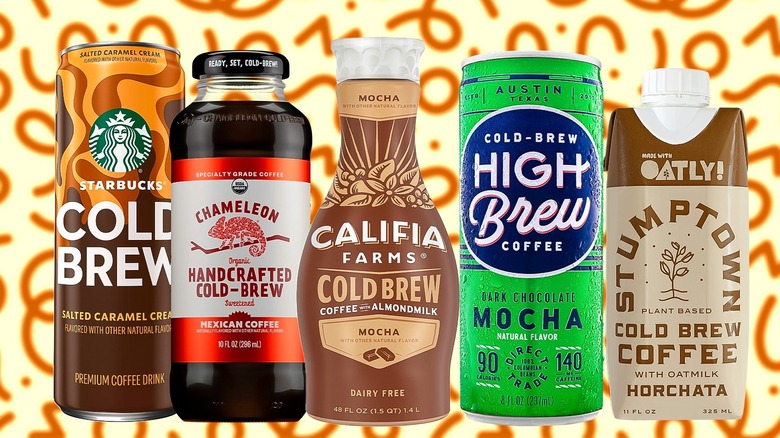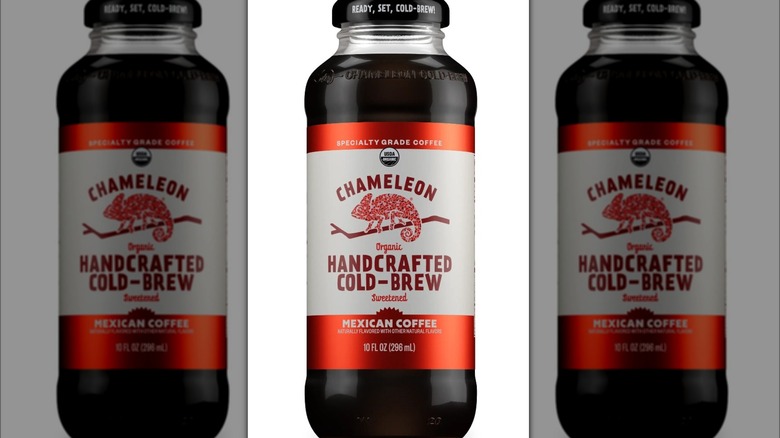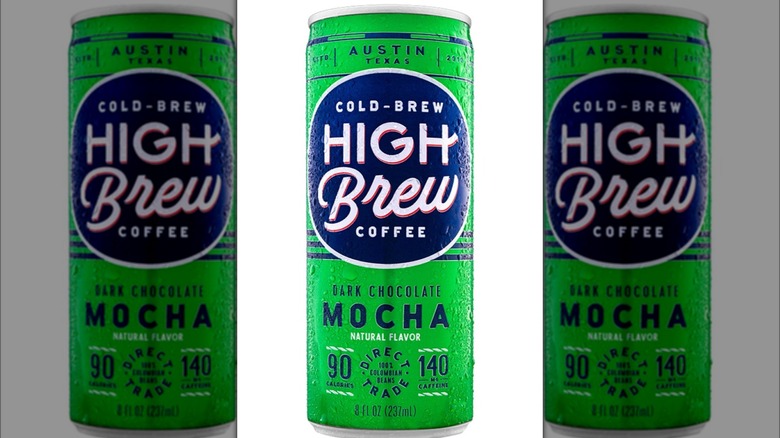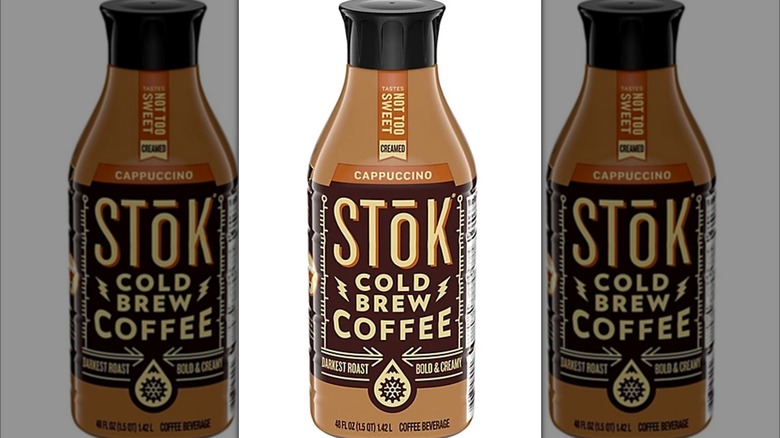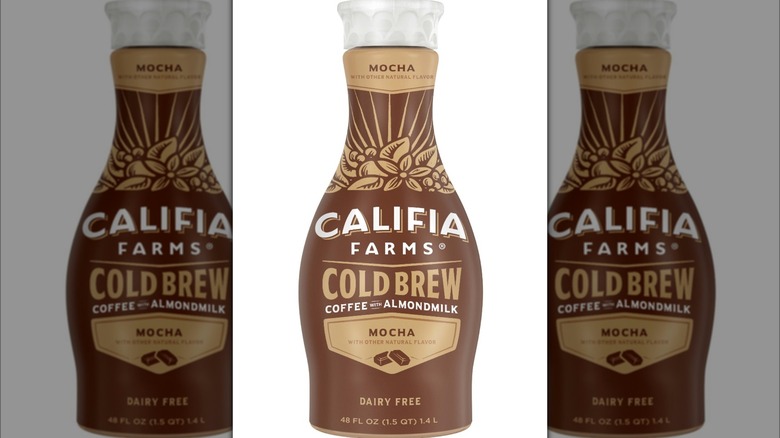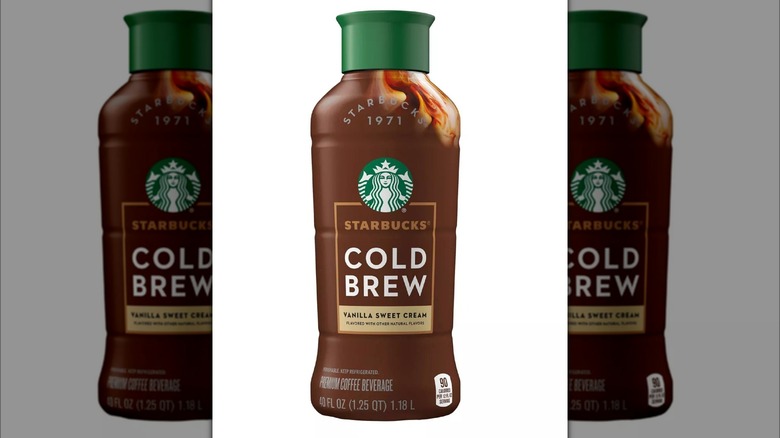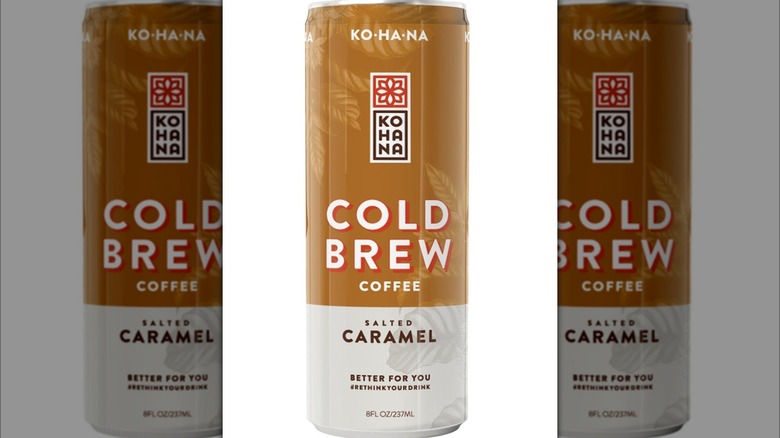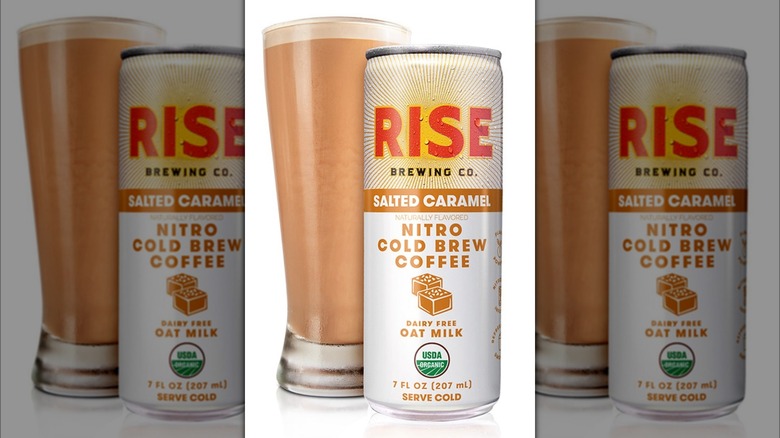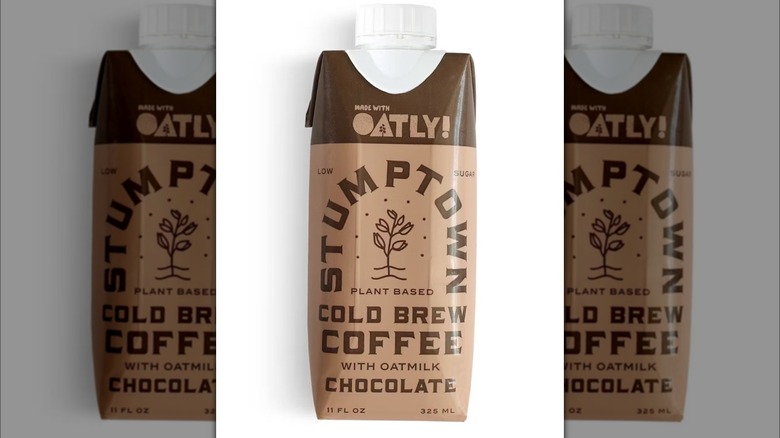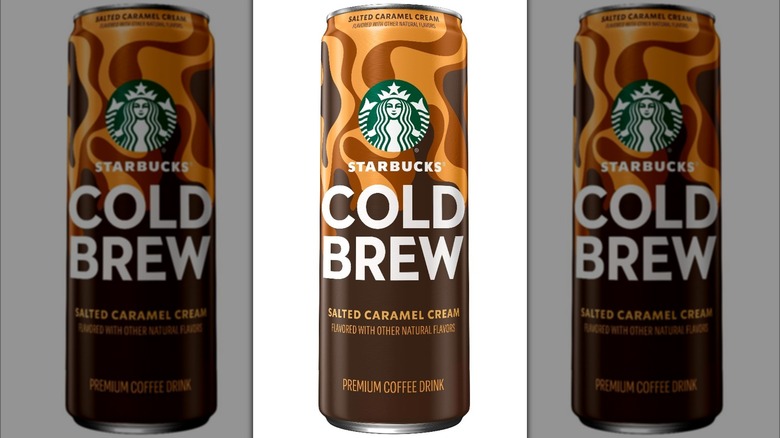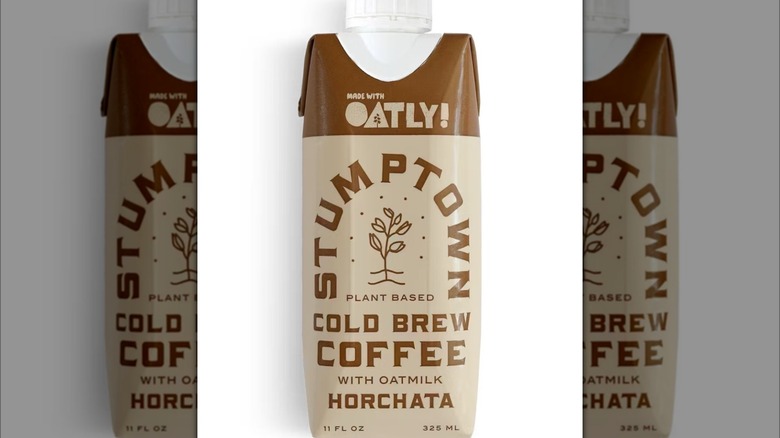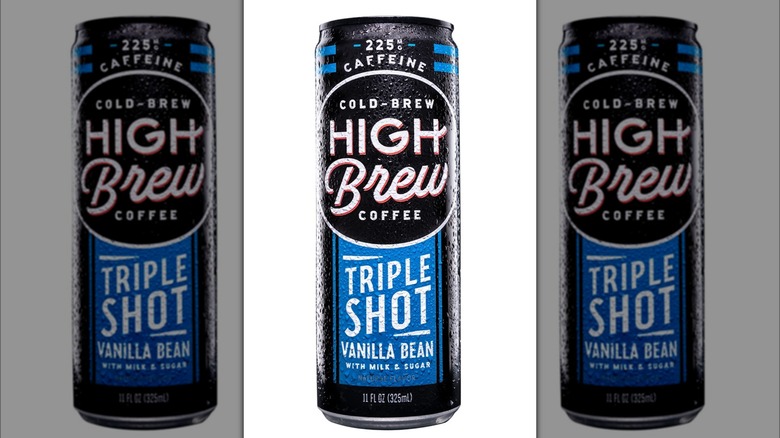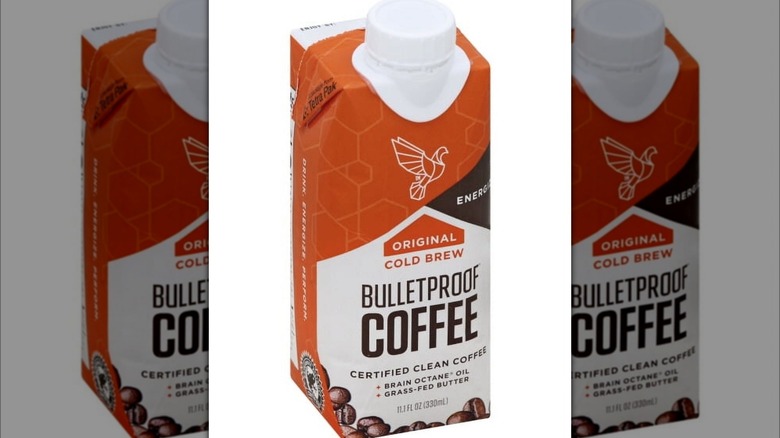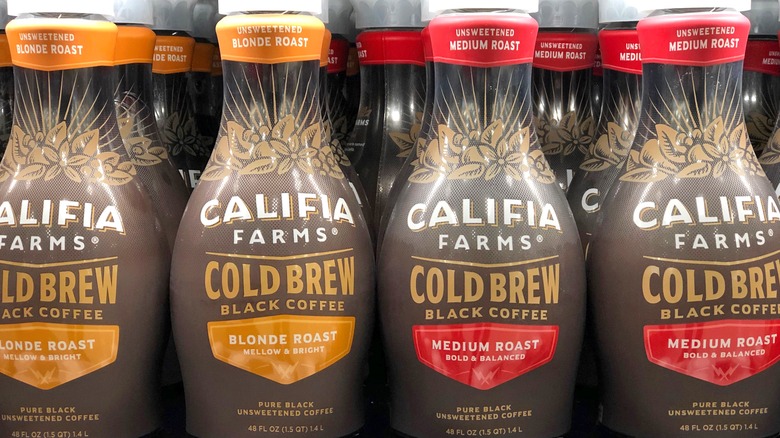The Unhealthiest Store-Bought Cold Brew Coffee You Can Find
We may receive a commission on purchases made from links.
Whether you need energy on a bright summer morning or you just can't take another hot coffee for your afternoon pick-me-up, cold brews have rightfully taken their place on coffee shop menus and grocery store aisles, offering us a beverage that's refreshing and robust. Although contested, the cool and caffeinated drink perhaps got its start at Stumptown Coffee Roasters in Portland, but it boomed in popularity throughout the 2010s, with Starbucks introducing it nationwide by 2016.
Crafting a cold brew isn't as easy as throwing ice cubes into your leftover coffee, either –– using cold water to soak the grounds for hours is just part of what makes cold brew different from iced coffee. What's more, cold brew has the potential to be a healthier alternative since the brewing process results in less acidity, meaning you might not need cream and sugar to achieve a smooth taste.
Be warned, however –– not all store-bought cold brews deliver much on the wellness front. In fact, many of them are downright unhealthy. Apart from sneaking in unnecessary added sugars, you'll be surprised to find many of these cold brews pack in high sodium levels, along with excessive additives and in one case, even butter. Take a look at our list of some of the unhealthiest store-bought cold brews to help you decide which ones to avoid when you want to get your caffeine buzz but keep your wellness in check.
Chameleon Mexican Coffee Cold Brew
When searching for a store-bought cold brew, you're usually bombarded with little variety and the same flavor line-up of vanilla, mocha, and caramel. Chameleon's Mexican Coffee cold brew is a unique pick among the classics, but its originality doesn't save it from being a poor choice health-wise. Labeling the cold brew as Mexican coffee stirs images of full-bodied and flavorful coffee beans from Mexico's rich soil, or maybe even a Café de Olla with cinnamon, brown sugar, and other unexpected ingredients in Mexican coffee. However, Chameleon's take on Mexican coffee is more straightforward, listing only organic cold brew, cane sugar, and cinnamon on the back of the bottle. The refreshingly short and uncomplicated list of ingredients lends itself nicely to the cold brew's nutrition facts, which deliver zero grams of fat and only 5 milligrams of sodium.
However, Chameleon perhaps tried to make up for the cold brew's lack of actual Mexican flavors with sugar –– in a 10-ounce bottle the buzzy beverage packs in 12 grams of added sugars (24% of the recommended daily intake), and an accompanying 70 calories. Unlike sugars found naturally in fruit or milk products, the American Heart Association reminds us that added sugars only contribute calories without any nutritional value, meaning you're better off finding a cold brew that's not so artificially sweet.
High Brew Dark Chocolate Mocha Cold Brew
Nothing beats dark chocolate and coffee to jump-start your mornings, but you might want to rethink grabbing a can of High Brew's cold brew for your wellness' sake. You can find the brand's mocha concoction anywhere from gas stations to convenience stores, boasting 90 calories and 140 milligrams of caffeine per serving. Considering 8 ounces of coffee is around 80 to 100 milligrams of caffeine, High Brew's cold brew packs a little more than a cup of joe in the 8-ounce can, but 90 calories in such a small beverage is leaning toward the higher side. A lot of these calories come from wholesome ingredients the brand uses for the mocha flavor, like reduced-fat milk and cocoa powder, but a heavy dose of cane sugar makes this cold brew more of a sugar high than caffeine boost.
After only one gram of fat and 30 milligrams of sodium, the cold brew's 11 grams of added sugars stand out glaringly on the nutrition label, delivering 21% of your daily intake in a meager morning coffee. At least High Brew isn't trying to hide anything –– a sweetness meter on the brand's product page is aptly filled to the brim.
Scanning down the ingredients list, a final additive called pectin might catch your attention. While pectin is a naturally occurring carbohydrate used to emulsify many beverages, why take on the unnecessary additives and sweetness when you can make a healthier easy cold brew right at home?
Stok Cappucino Creamed Cold Brew
The first thing that jumps out on the bottle of Stok's Cappuccino Creamed cold brew is a banner advertising the beverage as "Not Too Sweet." A quick glance at the nutrition facts on the back of the bottle, though, has us worried what the brand would consider "Too Sweet." In a 12-ounce serving, the cold brew delivers 13 grams of added sugars, plus 140 calories and 3.5 grams of fat. Cane sugar is its main source of added sugars, reaching around a third of your daily recommended intake. Opposed to natural sugars that take longer to digest, added sugars hit your bloodstream all at once, jolting you with an initial rush followed by a crash.
A hefty portion of the cold brew's fats and calories come from the skim milk and cream that give it a frothy, cappuccino-inspired flavor, but it's a far cry health-wise from the brand's unsweetened black cold brew, for example, with exactly zero grams of sugar and only 15 calories per serving. Another ingredient listed under the nutrition facts is gellan gum, a common additive in store-bought dairy drinks that helps to extend shelf life by keeping milk blended into the beverage rather than sinking to the bottom. While gellan gum is generally considered safe (via Healthline), when wellness is a priority, we'd prefer a cold brew without the additives, period.
Califia Farms Mocha Cold Brew
Grabbing a jug of Califia Farms Mocha cold brew out of the fridge sounds like a delightful afternoon pick-me-up, but the caffeinated beverage doesn't have much to offer you health-wise. The big bottle contains six servings of 8 ounces, and although each glass of the mocha has zero unsaturated fats, it loads you up with 3 grams of fat, 87 calories, and 10 grams of added sugars. Considering 8 ounces is only the size of a measuring cup, we figure it'd be way too easy to go overboard with this cold brew.
Apart from the expected ingredients like cold brew, almond milk, and cane sugar, the label also mentions several additives and one element that might surprise you –– sea salt. It's not just a pinch, either, each serving delivers 200 milligrams of sodium, totaling up to almost 10% of the recommended daily intake. For comparison, one cup of this cold brew is just 10 milligrams short of a small bag of Doritos. Given the addictive nature of the salt and sugar combo, it'd be even more difficult to put this cold brew down, quickly becoming a disproportionate nutrition score for just a drink.
Excessive sodium levels have snuck their way into plenty of our everyday foods and sauces, complicating the maintenance of our blood pressure and cardiovascular health. With so many other options available, there's no need to pile on extra sodium by drinking this cold brew.
Starbucks Vanilla Sweet Cream Cold Brew
We know you love Starbucks but hey, someone's gotta hold the coffee behemoth accountable, right? The chain's vanilla sweet cream cold brew is a beloved summer favorite both in-store and bottled in supermarkets, but it's more of a sweet treat than a caffeine fix. To give credit where it's due, the list of ingredients on the back of the bottle is short and uncomplicated, free of any additives, and including cold brew, reduced-fat milk, cream, and sugar –– lots of sugar. It may not stand out among the other ingredients, but the nutrition facts show that each serving contains 13 grams of added sugars, over a fourth of the daily recommended value. Apart from the sweetness overload, a 12-ounce glass of the cold brew delivers 90 calories, 2 grams of fat, and 20 milligrams of sodium.
While a little sweetness perfectly highlights the rich flavors of cold brew, sugar can become an addictive substance whose overconsumption leads to plenty of health complications, from cavities to an increased risk of diabetes. One easy way to take care of your wellness is by cutting out these sugary cold brews and adding a bit of sugar yourself to achieve that perfect taste.
Kohana Caramel Cold Brew
A can of Kohana's salted caramel cold brew appears innocent, like the perfect size for grabbing on the go. While a slogan across the front reads "Better For You," a brief look at the details on the back leads us to believe the brand isn't referring to our wellness. Nonfat and whole milk are the cold brew's first two ingredients, delivering 90 calories and 2 grams of fat, which sounds reasonable enough. However, in such a small serving of only 8 ounces, it packs 160 milligrams of sodium from sea salt and 12 grams of sugar, adding up quickly if it's accompanying a meal or snack. Reducing our daily intake of salt and sugar is a simple choice to help look after our bodies, but it's equally important to break down where the sugars we consume come from.
Six grams of the cold brew's sugars are added from cane sugar, two are natural sugars from milk, and the final 4 grams are sugar alcohol from erythritol and monk fruit extract. Although monk fruit extract is sweeter than table sugar, it delivers zero calories and no increase in blood glucose levels; additionally, the FDA has deemed it safe to consume. Mounting research suggests, though, that the high levels of erythritol in our foods could harm our cardiovascular health (via WebMD), making us even more keen to stick to cold brews without additives for our body's wellness.
Rise Salted Caramel Cold Brew
With about the same amount of caffeine as your morning coffee, a can of Rise's salted caramel cold brew looks like every java enthusiast's dream, but it's definitely not the most health-conscious option. At just 7 ounces, the cold brew delivers 120 calories, 6 grams of fat, and 3% of the daily recommended intake of saturated fats. The majority of these fats and calories come from the unexpected sunflower oil in the ingredients list, which, maybe you'd prefer to leave the high-fat oils out of your beverages.
Rise's cold brew is dairy-free, using organic oats as a milk substitute, and incorporates other ingredients like cane sugar, sea salt, and an additive called potassium carbonate that tones down the coffee's acidity. The tallies are quite high for its tiny serving size, with 120 milligrams of sodium and 12 grams of added sugars, or a fourth of the daily suggested amount. Foods high in fat and carbs tend to bring on drowsiness, so if you pair this brew with a meal, it could just contribute to making you sleepier instead of giving you the jolt you desire.
Stumptown Chocolate Cold Brew
Founded in Portland, Stumptown Coffee Roasters garnered local fame among java aficionados for its high-quality beans and sustainable practices. While you can now find its line of store-bought cold brews across the nation, you're better off choosing another buzzy beverage with less calories and sugar. In its 11-ounce carton, Stumptown's chocolate cold brew contains 140 calories, 6 grams of fat, and 9 grams of added sugars. For reference, that's about the same amount of sugar as two Oreo cookies.
Furthermore, after the expected ingredients of oat milk, cane sugar, and cocoa powder, the cold brew lists several additives. One of them, potassium phosphate, is commonly used to stabilize and improve the appearance of beverages, but in excessive amounts could become problematic for our kidneys (via Livestrong). You'll also notice rapeseed oil in the chocolatey beverage, another ingredient that is frequently used but highly processed and genetically modified. We'd be more forgiving if the cold brew were presented as a sweet treat, but the vegan, plant-based, and low-sugar advertising gives the drink a health-conscious vibe that just doesn't match its nutrition facts.
Starbucks Salted Caramel Cream Cold Brew
The sugary gooeyness of caramel pairs so nicely with the deep and robust flavors of our caffeine-infused beverages, but for improved wellness, it's best to make a little go a long way, and Starbucks salted caramel cold brew has missed the sweet spot. Unsurprisingly, sugar is one of the drink's main ingredients after cold brew and skim milk. In the 11-ounce can, you'll find 120 calories, 110 milligrams of sodium from sea salt, and a whopping 15 grams of added sugars. Since our bodies don't require added sugars for healthy functioning, there's not even an official number for the recommended daily intake, but the American Heart Association would consider one can of this cold brew to be around half of a day's amount. What's more, an excessive consumption of added sugars can increase your risk for cardiovascular issues.
The treacly beverage also has 2.5 grams of fat from the cream in its ingredients, including 1.5 grams of saturated fats, or 8% of a healthy daily value. Because saturated fats can increase the cholesterol in our bloodstream, they're equally hard on our cardiovascular systems and can make us more susceptible to heart disease (via NHS). We should generally avoid added sugars and saturated fats, because no matter how tasty, no beverage is worth jeopardizing your heart.
Stumptown Horchata Cold Brew
Horchata originated in the Mediterranean but has made its way across the globe, treasured for its delightful balance between creamy and refreshing. The slightly sweet beverage has many variations, from using tiger nuts in the Valencian region of Spain to a rice and cinnamon base in Mexico that's almost like arroz con leche in liquid form. While it's great to see Stumptown offering a unique flavor of cold brews, it definitely doesn't target your wellness checklist.
Stumptown opted for oat milk for the characteristic hearty and nutty flavors, but apart from that, we wonder what makes this cold brew worthy of the horchata name. All of the other ingredients are hardly distinct, in fact, after cane sugar, the back of the bottle lists an unfortunate amount of additives. While the product page describes the cold brew as "a little spicy," the only possible indication of spice among the ingredients is rapeseed oil or the ambiguous "natural flavors."
Nutritionally, it has only one gram of fat but 70 milligrams of sodium from sea salt and 13 grams of sugars, seven of which are added. Most shocking are the 170 calories that are somehow crammed into the 11-ounce carton. Considering you can whip up an easy horchata at home, as far as cold brews go, you can find better.
High Brew Vanilla Bean Triple Shot Cold Brew
For moments when you feel especially sluggish, High Brew's vanilla bean cold brew will strike you as the most energizing option, with 225 milligrams of caffeine per serving. Although the brand's product page celebrates its brew for delivering three times the caffeine of your average cup of joe, all that caffeine probably isn't necessary, and it definitely makes for an unhealthy option among cold brews. In fact, it's even more caffeinated than an energy drink, considering a can of Monster hits you with 160 milligrams of caffeine. A sudden surge of caffeine to our system can reap all sorts of negative effects, from anxiety and jitters to heart palpitations or arrhythmias.
Apart from its wired cold brew, High Brew's vanilla bean concoction includes other ingredients like reduced-fat milk, cane sugar, pectin, and potassium phosphates. Take a look at the nutrition facts and you'll realize the disproportionate levels of caffeine aren't the beverage's only concerning detail –– in 11 ounces it also loads 1.5 grams of fat, 120 calories, and 17 grams of added sugars, overwhelming you with both a caffeine jolt and sugar rush. Maybe this cold brew would be better off advertised as a caffeinated milkshake, but we're certain you can expect a massive crash in wellness and energy by drinking it.
Bulletproof Original Cold Brew
In 2009, Dave Asprey posted his first recipe for Bulletproof coffee, a butter-blended, zero-sugar beverage that his company now sells as a convenient store-bought cold brew. You'll notice the brew includes surprising ingredients, like something derived from coconut oil called "brain octane oil," and grass-fed butter, amounting to 15 grams of fat and 12 grams of saturated fat –– 60% of your daily amount. The immense numbers for this cold brew are thanks to Asprey's idea that blending high fats into coffee slows the body's caffeine absorption, providing longer-lasting energy and mental clarity (via Healthline). Sounds promising, but the Institute of Medicine reveals not much can effectively extend your caffeine rush, and Asprey's concepts have largely been written off as fad diets.
In 11 ounces, the cold brew also contains 150 calories and although it's apparently sugar-free, it has 7 grams of alcohol sugar from additives like erythritol. Forget the additives and pseudoscience, you're better off leaving the extra fats out of your cold brews and finding a healthier alternative.
How we chose our cold brews
We started our search for the unhealthiest store-bought cold brews by selecting some of the most familiar brands for practical consumer consideration. From there, we analyzed the most popular flavors you'll see in the grocery store aisles, with special attention to those that might appear as healthy alternatives.
With a broad line-up in mind, we narrowed it down by reviewing the accompanying ingredients and nutrition facts. For cold brews, we considered it most important to call out the ones with high-calorie counts and egregious added sugar levels, while also contemplating the grams of fat and sodium levels. The serving size was a significant factor, considering some smaller cold brews often have higher fat and sugar counts when compared equally to those with larger serving sizes. Finally, we reviewed the ingredients to check which ones offered healthier, more wholesome components and which ones contained potentially unhealthy additives.
